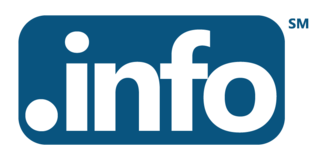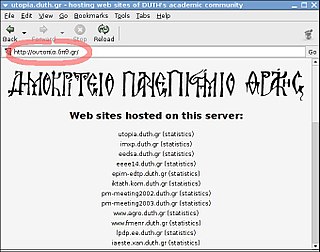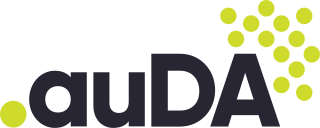The Domain Name System (DNS) is a hierarchical and distributed name service that provides a naming system for computers, services, and other resources in the Internet or other Internet Protocol (IP) networks. It associates various information with domain names assigned to each of the associated entities. Most prominently, it translates readily memorized domain names to the numerical IP addresses needed for locating and identifying computer services and devices with the underlying network protocols. The Domain Name System has been an essential component of the functionality of the Internet since 1985.

The Internet Corporation for Assigned Names and Numbers is a global multistakeholder group and nonprofit organization headquartered in the United States responsible for coordinating the maintenance and procedures of several databases related to the namespaces and numerical spaces of the Internet, ensuring the Internet's stable and secure operation. ICANN performs the actual technical maintenance work of the Central Internet Address pools and DNS root zone registries pursuant to the Internet Assigned Numbers Authority (IANA) function contract. The contract regarding the IANA stewardship functions between ICANN and the National Telecommunications and Information Administration (NTIA) of the United States Department of Commerce ended on October 1, 2016, formally transitioning the functions to the global multistakeholder community.

The Internet Engineering Task Force (IETF) is a standards organization for the Internet and is responsible for the technical standards that make up the Internet protocol suite (TCP/IP). It has no formal membership roster or requirements and all its participants are volunteers. Their work is usually funded by employers or other sponsors.

The Internet Assigned Numbers Authority (IANA) is a standards organization that oversees global IP address allocation, autonomous system number allocation, root zone management in the Domain Name System (DNS), media types, and other Internet Protocol–related symbols and Internet numbers.
The Internet Architecture Board (IAB) is "a committee of the Internet Engineering Task Force (IETF) and an advisory body of the Internet Society (ISOC). Its responsibilities include architectural oversight of IETF activities, Internet Standards Process oversight and appeal, and the appointment of the Request for Comments (RFC) Editor. The IAB is also responsible for the management of the IETF protocol parameter registries."

The domain name .org is a generic top-level domain (gTLD) of the Domain Name System (DNS) used on the Internet. The name is truncated from 'organization'. It was one of the original domains established in 1985, and has been operated by the Public Interest Registry since 2003. The domain was originally "intended as the miscellaneous TLD for organizations that didn't fit anywhere else." It is commonly used by non-profit organizations, open-source projects, and communities, but is an open domain that can be used by anyone. The number of registered domains in .org has increased from fewer than one million in the 1990s, to ten million in 2012, and held steady between ten and eleven million since then.
The Domain Name System Security Extensions (DNSSEC) are a suite of extension specifications by the Internet Engineering Task Force (IETF) for securing data exchanged in the Domain Name System (DNS) in Internet Protocol (IP) networks. The protocol provides cryptographic authentication of data, authenticated denial of existence, and data integrity, but not availability or confidentiality.

.info is a generic top-level domain (gTLD) in the Domain Name System (DNS) of the Internet. The name is derived from information, although registration requirements do not prescribe any particular purpose.

An internationalized domain name (IDN) is an Internet domain name that contains at least one label displayed in software applications, in whole or in part, in non-Latin script or alphabet or in the Latin alphabet-based characters with diacritics or ligatures. These writing systems are encoded by computers in multibyte Unicode. Internationalized domain names are stored in the Domain Name System (DNS) as ASCII strings using Punycode transcription.
A country code top-level domain (ccTLD) is an Internet top-level domain generally used or reserved for a country, sovereign state, or dependent territory identified with a country code. All ASCII ccTLD identifiers are two letters long, and all two-letter top-level domains are ccTLDs.
The domain name arpa is a top-level domain (TLD) in the Domain Name System (DNS) of the Internet. It is used predominantly for the management of technical network infrastructure. Prominent among such functions are the subdomains in-addr.arpa and ip6.arpa, which provide namespaces for reverse DNS lookup of IPv4 and IPv6 addresses, respectively.
The Canadian Internet Registration Authority (CIRA) is the organization that manages the .ca country code top-level domain (ccTLD) for Canada. Its offices are located at 979 Bank Street in Ottawa, Ontario, Canada. CIRA sets the policies and agendas that support Canada's internet community and Canada's involvement in international internet governance. It is a member-driven organization with membership open to all that hold a .ca domain. As of March 2023, there were more than 3.3 million active .ca domains.

Afilias, Inc. was a US corporation that was the registry operator of the .info, .mobi and .pro top-level domain, service provider for registry operators of .org, .ngo, .lgbt, .asia, .aero, and a provider of domain name registry services for countries around the world, including .MN (Mongolia), .AG, .AU (Australia), .BM (Bermuda), .BZ (Belize), .AC, .GI (Gibraltar), .IO .ME (Montenegro), .PR, .SC, .SH, and .VC. Afilias also provided ancillary support to other domains, including .SG (Singapore), .LA (Laos), and .HN (Honduras). It was merged into Identity Digital in 2022.

.web is a proposed top-level domain (TLD) that was created and assigned by an auction process to several bidding companies. It was awarded to Nu Dot Co LLC, which is primarily funded by Verisign.

Internet governance consists of a system of laws, rules, policies and practices that dictate how its board members manage and oversee the affairs of any internet related-regulatory body. This article describes how the Internet was and is currently governed, some inherent controversies, and ongoing debates regarding how and why the Internet should or should not be governed in future.

Bill Woodcock is the executive director of Packet Clearing House, the international organization responsible for providing operational support and security to critical Internet infrastructure, including Internet exchange points and the core of the domain name system; the chairman of the Foundation Council of Quad9; the president of WoodyNet; and the CEO of EcoTruc and EcoRace, companies developing electric vehicle technology for work and motorsport. Bill founded one of the earliest Internet service providers, and is best known for his 1989 development of the anycast routing technique that is now ubiquitous in Internet content distribution networks and the domain name system.

IPv4 address exhaustion is the depletion of the pool of unallocated IPv4 addresses. Because the original Internet architecture had fewer than 4.3 billion addresses available, depletion has been anticipated since the late 1980s when the Internet started experiencing dramatic growth. This depletion is one of the reasons for the development and deployment of its successor protocol, IPv6. IPv4 and IPv6 coexist on the Internet.

Désirée Zeljka Miloshevic is an Internet public servant, and was a special advisor to the chair of the United Nations' Internet Governance Forum Multi-stakeholder Advisory Group. Additionally, she is Senior Public Policy and International Affairs Advisor in Europe for Afilias, the domain name registry.

.au Domain Administration (auDA) is the policy authority and industry self-regulatory body for the .au domain, which is the country-code top-level domain (ccTLD) for Australia. It was formed in 1999 to manage the .au ccTLD with the endorsement of the Australian Government and the authority of the Internet Corporation for Assigned Names and Numbers (ICANN). It is a not-for-profit membership organisation that promotes and protects the .au domain space.

Public Interest Registry is a not-for-profit based in Reston, Virginia, created by the Internet Society in 2002 to manage the .ORG top-level domain. It took over operation of .ORG in January 2003 and launched the .NGO and .ONG top-level domains in March 2015.














